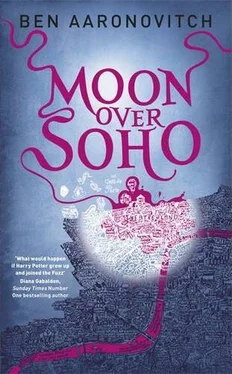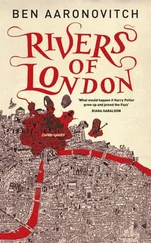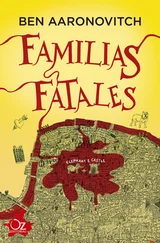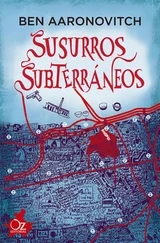One side of Sherwood Street has an arcade in the rather sad 1950s ceramic-tiled fashion that, having been designed to resemble a public convenience, was perhaps justifiably used by half-cut members of the public who got caught short late at night. As far as the Murder Team could reconstruct it later, it looked like the penis eater had been planning to take her latest victim into the shadows for an impromptu snog and vasectomy.
I found Ash prostrate in the center of a circle of concerned citizens, two of whom were trying to comfort him while he writhed around on the pavement. There was blood on him, on the concerned citizens, and on half a yard of iron spike that was stuck through his shoulder.
I got myself some room by shouting “Police!” at people and tried to get him into recovery position.
“Ash,” I said. “I told you to stay away from her.”
Ash stopped thrashing long enough to get a good look at me.
“Peter,” he said. “The bitch stuck me with a railing.”
Chapter 6
The Empress of Pleasure
THE MEN and women of the London Ambulance Service are not prone to hysterics, given that they spend their days scraping up the victims of fatal car accidents, suicide attempts both successful and botched, and members of the public who’ve “fallen” in front of a train. Those are called “one-unders,” incidentally. I once asked whether a couple under a train would be a “two-under” but apparently that’s a “two one-under.” Anyway, a daily routine consisting of pain and misfortune tends to breed steady and pragmatic personalities. In short, just the kind of person you want staffing your ambulance in the middle of the night. The paramedic in the ambulance who picked up Ash was a middle-aged woman with short practical hair and a New Zealand accent. But a couple of minutes into the ride I could see that her composure was beginning to slip.
“The bitch,” yelled Ash. “The bitch stabbed me with a railing.”
About two feet torn from a rather nice bit of Victorian wrought-ironwork, judging by the precisely milled orthogonal cross section. To my untrained eye it looked as if it had gone right through his heart. That hadn’t stopped Ash from thrashing around and yelling.
“Hold him down,” shouted the paramedic.
I grabbed Ash’s arm and tried to pin it to the gurney. “Can’t you give him something?” I asked.
The paramedic gave me a wild look. “Give him something?” she said. “He should be dead.”
Ash tore his arm from my grip and grabbed at the railing.
“Get it out!” screamed Ash. “It’s cold iron, get it out!”
“Can we pull it out?” I asked.
That was the last straw for the paramedic. “Are you fucking crazy?”
“Cold iron,” he said. “Killing me.”
“We’ll take it out at the hospital,” I said.
“No hospital,” said Ash. “I need the River.”
“Dr. Walid will be there,” I said.
Ash stopped thrashing and grabbed my hand, pulled me closer.
“Please, Peter,” he said. “The River.”
Polidori talks about cold iron having a deleterious effect upon the fae and their many cousins but I assumed he was making it up or stating the bleeding obvious. Cold iron has a deleterious effect on anyone if you shove it right through their body.
“Please,” said Ash.
“I’m going to pull this out of him,” I said.
The paramedic expressed her opinion that she felt this would be a poor course of action and that, for even contemplating it, I was an anatomically incomplete person of low intelligence and with a penchant for self-abuse.
I got both hands on the railing. It was slippery with blood. Ash saw what I was doing and held himself rigid. It wasn’t the ripping sound it made when it came out that bothered me; that was masked by Ash’s screaming. It was feeling the vibrations as the bone scraped along the rough edge of the iron that I won’t forget.
A jet of blood smacked me in the face. I smelled copper and, weirdly, a mixture of greasepaint and ozone. The paramedic shoved me out of the way and I fell backward as the ambulance took a corner. She started slapping dressings on entry and exit wounds and taping them in place. The dressings were soaked red before she’d even finished. As she worked she swore under her breath.
Ash had stopped thrashing and gone silent. His face was pale and slack. I stumbled forward in the ambulance until I could stick my head into the driver’s cab. We were heading up Tottenham Court Road — less than five minutes from the hospital.
The driver was my age, white, skinny, and wore a skull-and-crossbones stud in his ear.
I told him to turn around and he told me to fuck off.
“We can’t take him to the hospital,” I said. “He’s booby-trapped.”
“What?” yelled the driver.
“He may be attached to a bomb,” I said.
He hit the brakes and I was thrown headfirst into the cab. I heard the paramedic in the back scream with frustration and I looked up to find the driver’s-side door open and the driver legging it down the road.
It was a really good illustration of why you shouldn’t use the first lie that pops into your head. I climbed into his seat, closed the door, put the ambulance into gear, and off we went.
The London Ambulance Service uses a fleet of Mercedes Sprinter vans, which are just like your standard Sprinter but with about two tons of stuff in the back and the kind of soft suspension designed to avoid killing a patient every time you go over a speed bump.
It’s also got a pile of extra LCD screens, buttons, and switches that I, in the interest of simplicity, just ignored. Which was why we were still doing blues and twos as we sailed past the entrance to the UCH ambulance bay and headed down Gower Street toward the river.
It was about this time, according to the EOC call log, that the paramedic used her airwave to report that her ambulance had been hijacked by an escaped mental patient masquerading as a police officer.
There’s nothing quite like driving an emergency vehicle with a strip of spinners on its roof and a full-sized siren designed to cut through the iPod, car stereo cocoon that most drivers live in and scare random pedestrians back onto the pavements. Moses parting the Red Sea would have felt like I did as I plowed across the junction with High Holborn into Endell Street with a brief moment of déjà vu as I shot down Bow Street and past the scaffolding that marked where they were still repairing the damage done to the Royal Opera House.
It’s easy to get messed up trying to go south from Covent Garden. The roads have all been bollarded and blocked to stop them from becoming traffic rat runs, but I’d spent two years patrolling out of Charing Cross nick so I knew where they were. I did a sharp right into Exeter Street and a sharp left down Burleigh Street, which caused the paramedic in the back to start screaming at me again. Which was uncalled for, since I felt I was finally getting on top of the ambulance’s tricky handling.
“How’s he doing?” I yelled over my shoulder.
“He’s bleeding to death,” she yelled back.
I merged briefly with the cars on the Strand before cutting across the oncoming traffic and into Savoy Street, a narrow lane that runs straight down to the river just west of Waterloo Bridge. Parking spaces are hard to find in Central London and people tend to pack their cars onto streets with no thought that a vehicle of some width and heft might be driven past by someone with less-than-full confidence in his control. All told, the actual total damages came in a tad less than twenty thousand pounds, mostly scraped paint, wing mirrors, side panels, and a pair of racing bikes that should never have been left secured to a roof rack in the first place. That’s not counting the damage to the ambulance, which I’m sure was entirely superficial.
Читать дальше












